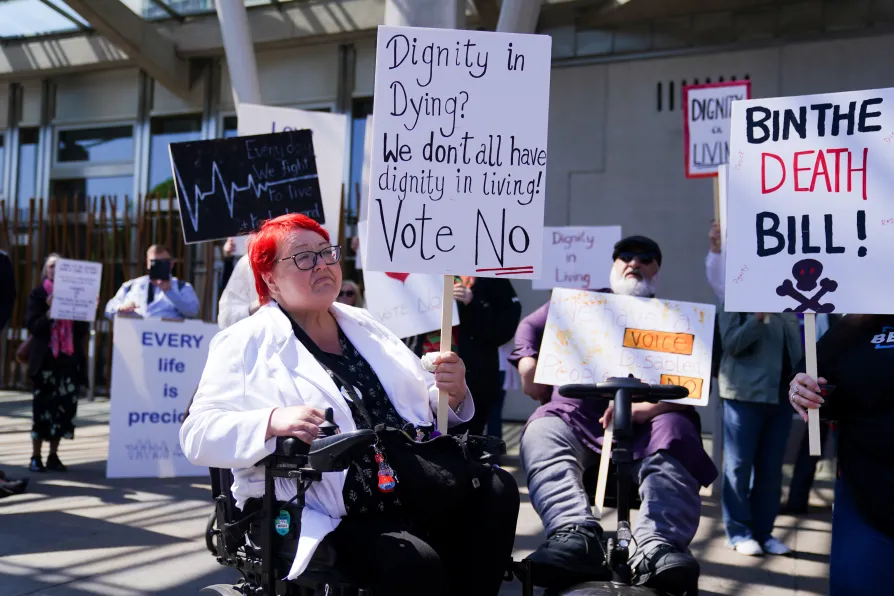
 Protesters from the Glasgow Disability Alliance demonstrating outside the Scottish Parliament in Edinburgh, May 13, 2025
Protesters from the Glasgow Disability Alliance demonstrating outside the Scottish Parliament in Edinburgh, May 13, 2025
ASSISTED suicide returns to Parliament on Friday. Separate Scottish legislation passed its first stage at Holyrood this week.
The left’s attention is, naturally, focused on a government trumpeting its hostility towards immigrants, shortly after its declaration of war on disabled people through social security cuts.
We should not ignore Kim Leadbeater MP’s Bill, however. The context of increasing repression of vulnerable groups is one reason many find the legislation so frightening.
Assisted death could soon be legal. It could have its final reading in the Commons on Friday. The number of amendments for debate make this unlikely: it will probably return next month. But it cannot be ruled out. So concerns must be aired now.
Some MPs who supported the Bill at second reading acknowledged that it lacked effective safeguards against coercion or abuse: concerns raised even by organisations supportive of assisted dying in principle, such as Liberty. MPs hoped safeguards could be strengthened at committee stage.
This has not happened. Disability rights groups were not even called to give evidence to the committee, whose selection of witnesses was deemed a “stitch-up” and “skewed towards the pro-assisted dying lobby” by disabled activists Tony Jennings and Paula Peters.
All eight witnesses proposed by Leadbeater to give evidence on countries where assisted suicide is legal were supporters, despite controversies over its rollout to children and the mentally ill in Belgium and the Netherlands, and evidence of coercion and a strong correlation to poverty in Canada.
Almost all amendments proposing stronger safeguards — that doctors be barred from suggesting it to patients, that people with mental health or eating disorders such as anorexia be exempted — have been rejected. One safeguard supporters previously stressed, applications’ sign-off by a High Court judge, has actually been removed.
The government’s impact assessment has only exacerbated fears by predicting cost savings both for the NHS and for other areas of spending, including state pensions.
The equality impact assessment focused on barriers disadvantaged groups might face in accessing assisted death rather than on additional risks it might pose to them, even suggesting that eligibility criteria might need to be loosened for the disabled or ethnic minorities. Yet as Diane Abbott MP points out, these are the groups who most fear facing pressure to end their lives.
In the words of Not Dead Yet’s Liz Carr: “There’s no recognition… of the inherent discrimination in a Bill that offers ill, older and disabled people suicide support rather than suicide prevention like everyone else.”
Doctors are divided, with BBC research this week finding more GPs opposed than in favour. The Royal College of Psychiatrists warns against it in the strongest terms, saying the Bill is not safe and psychiatrists could not perform the functions it requires of them.
Many point to the double standard in the state relying on charities to provide palliative care but being prepared to funnel resources towards ending lives.
Leadbeater tries to address this, calling for a new commission on palliative care. But government commissions don’t guarantee action, let alone the comprehensive reordering of government priorities we would need to see if palliative care — or for that matter social care, or mental healthcare — are to be properly resourced.
We would, in fact, have to reverse the entire direction of this government — its attitude to spending, to public services, to disabled people, to immigrants — before we could take such concessions seriously. Legalising assisted suicide on the basis that problems would disappear if we defeat the government in every other policy field would be reckless.
Too many proponents of assisted dying still discuss it in terms of abstract principles. We must consider what it would look like in our society, and through this Bill.
And too many people find that terrifying. MPs should vote against the Bill at third reading. If they do not, as Jennings puts it, “disabled people will pay with their lives.”

Focus on equal access to assisted death rather than risks of legalisation for oppressed groups wrongheaded, MPs and campaigners say













